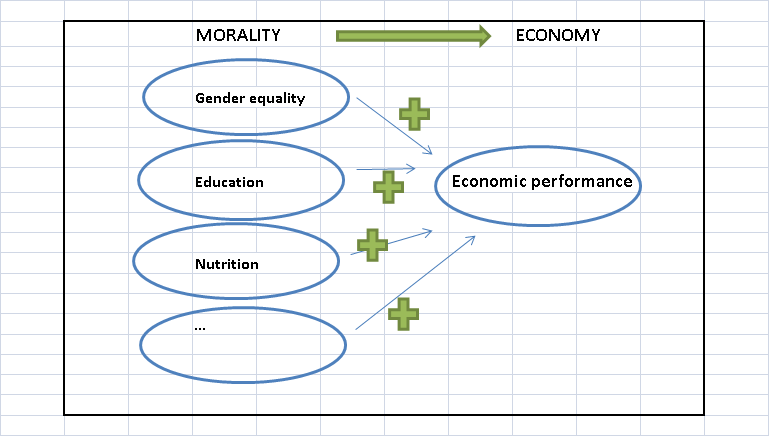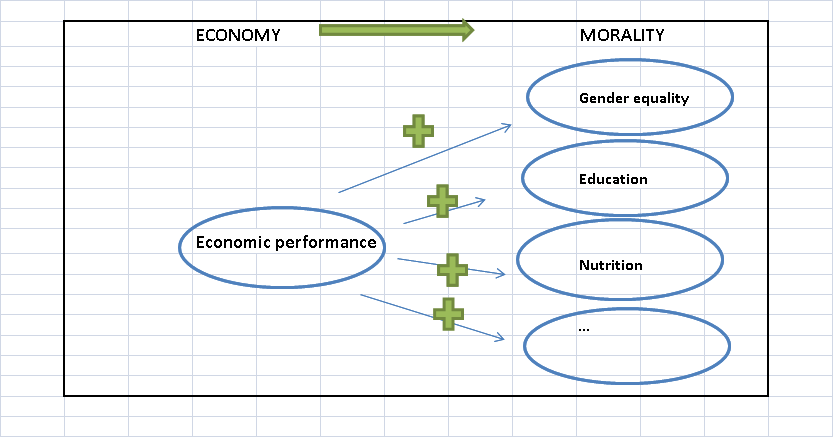Central banks have the duty to keep inflation below but near a certain level (2% in the case of the U.S. and the Eurozone). They use monetary policy for doing so. In case inflation gets too low, they decrease the interest rate, thereby spurring lending, hence inflation. In case inflation gets too high, they do the reverse. This policy is believed to be effective, and to have contributed to normalization of the inflation-rate in the past.
All well and good so far. But as anyone knows by know: there is something odd going on. We hit the 0% interest rate level in the U.S., and have even reached -0.4% in the Eurozone. This is a logical consequence of decreasing the interest rate more in times of accommodative policy than decreasing it in times of tightening: a downward trend, hitting 0%, and rates below 0%, at some point in time.
The year 2025
In principle, central banks could continue this downward trend in the interest rate indefinitely. In practice, most likely not. Lets take a look into the future, and see what would happen if we would continue this downward trend.
Suppose it is the year 2025, and, for whatever reason, we have (the risk of) deflation in the Eurozone. The ECB – having increased the interest rate from the level of -0.4% in 2017 – decreases the interest rate gradually from (let’s say) 1.5% to -1.5% (a decrease of 3%, which is less than the decrease after the crisis in 2007, hence not unrealistic). So now we have an interest of -1.5%.
Given such a low interest rate, either of two things are likely to happen, that we might want to avoid at all costs: the net income of retail banks gets literally nullified, or retail banks have to charge customers for keeping their money.
As shown in quantitative research, a decrease of 1 percentage point in the 3-month yield (which will occur in case of a decrease in the deposit rate to -1.5%) leads to a decrease in the net interest margin of banks (in advanced economies) of 60 basis points. What does this mean in case of our rate decrease to -1.5%?
Take ING (the largest Dutch retail bank) as an example. ING has a net interest margin of around 1.5% over 2016, resulting in a net interest income of around 13.2 billion euros, and a net income of 4.651 billion euros.
source: tradingeconomics.com
Inflation in the U.S.
A rate decrease to -1.5% will cause ING’s net interest margin to decrease to less than 0.9%, implying its net interest income will be 40% lower than in 2016, decreasing by +- 5.2 billion euros. Hence ING’s entire profit will obliterated. Assuming that the lion-share of cost-cutting has been done already in response to the crisis of 2007, this leaves little room to cut costs. And anyway: if the down-trend in the interest rate will continue, at some point the net interest income will become so low than no cost-cutting measures can make up for that.
Hence, decreasing the interest rate beyond some point will seriously put to risk the existence of retail banking in the Eurozone. Assuming that Draghi doesn’t want that to happen, the interest rate can never get lower then a certain level (-1.4% in our example – the real number might of course be different, but this doesn’t affect the principle at stake here).
Retail banks could of course adjust their business model, and charge people for holding their money. Suppose that, in case the interest rate gets below a certain point, banks will do so. How much can they charge people before people will withdraw their money and start putting it into safes? Let’s say that banks, due to lower net interest incomes resulting from the lower interest rate, charge customers 0.5% for holding their savings. If you own 200.000 euros, this comes down to 1000 euros a year. I can imagine this might already be sufficient for many people to start putting their money into a safe instead of their bank, hence causing significant draw-downs, and endangering the banking system. Again: the real interest rate at which this event might occur might differ from this example, but the principle still holds.
Assuming Draghi doesn’t want this to happen either, we can never lower the interest rate below a certain level.
What then?
But, assuming that we can never lower the interest rate below a certain level (which might be not too far in the future as showed by the reasoning above), what then can we do to deal with low inflation in the future? Lowering interest rates is no option any more.
One possibility would be fiscal policy. We could push the responsibility for maintaining a reasonable level of inflation from central banks to governments. But this might very well imply that governments have to borrow significant amounts of money to kick-start inflation. Judging by the amount of money pushed into the market by the ECB to increase inflation, this lending will lead to exorbitant increases in public debt, hence interest payments.
Central banks could of course buy other assets, such as equity, instead of bonds, when the interest rate has reached its lowest level. The problems from doing so are obvious: it might cause a significant disconnect between share prices and real business activity, resulting in bubbles. Furthermore, it might not be very effective in increasing inflation, because we don’t know how much of the money put into stocks will eventually reach the real economy.
Another option would be helicopter money. But what if the helicopter stops dropping money? Then we are left with higher prices, but not more money to pay for them, laying the foundation for another period of deflation.
Accepting deflation
We could also just accept deflation. We have been trying to fight it for over 30 years, like our lives depend on it. But do they? How problematic would it be for prices to decrease for an extended period of time? Would people really stop buying stuff, because it will become cheaper in the future? That seems unrealistic. People still need to buy food, clothing, and still need a roof above their head. So deflation might not be such a big issue after all – unless it becomes extreme, of course.
It is choosing the least worst option among a bunch of bad options. Hence we should not rule out any response to low inflation because its effects are undesired: it might still be the best option.
One thing seems crystal clear: we have to think about future responses to low inflation, because the path we have currently taken seems to be near reaching its end point.



